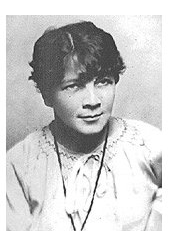Government is not reason, it is not eloquence — it is force.
Said George Washington.
The state is the coldest of all cold monsters that bites with stolen teeth.
Said Nietzsche.
Government is solely an instrument or mechanism of appropriation, prohibition, compulsion, and extinction; in the nature of things it can be nothing else, and can operate to no other end…. Seen in this light, government is so horrific — and its actual operations in the past have been so horrible at times — that there is some excuse for a failure to realize its necessity.
Said Isabel Paterson.
Take care, you who call yourself my judge. Take care what you do. For the truth is that I have my mission from God, and you put yourself in great danger.
Said Joan of Arc (aged 17) to her chief Inquisitor.
They rowed her in across the rolling foam —
The cruel, crawling foam — to her grave beside the sea.
Wrote the English author Charles Kingsley (1819 – 1875) — in response to which the pedantic John Ruskin said:
The foam is not cruel, neither does it crawl.
Unquote.
We talk about our assholes, and we talk about our cocks, and we talk about who we fucked last night, or who we’re going to fuck tomorrow, or when we got drunk, or when we stuck a broom in our ass in the Hotel Ambassador in Prague — anybody tell one’s friends about that.
Said “poet” Allen Ginsberg, in an anthologized interview.
A writer of something occasionally like English — and a man of something occasionally like genius.
Said Swinburne of Walt Whitman.
A man standing up to his neck in a cesspool — and adding to its contents.
Said Thomas Carlyle of Swinburne.
Quoting Noam Chomsky, in Language and Politics (p. 293):
I’ve never considered myself a ‘Marxist,’ and in fact regard such notions as ‘Marxist’ as belonging more to the domain of organized religion than of rational analysis.
Then, quoting Noam Chomsky on p. 113 of the exact same book:
In my opinion, a Marxist-anarchist perspective [on politics] is justified quite apart from anything that may happen in linguistics.
And on p. 153 of this self-same book:
I wouldn’t abandon Marxism.
Unquote.
In his ideological fanaticism [Noam Chomsky] constantly shifts his arguments and bends references, quotations and facts, while declaring his ‘commitment to find the truth.’
Said Leopold Labedz.
Everything vital in the world comes from neurotics. They alone have founded religions and composed our masterpieces.
Said Proust.
God, if there is one, please save my soul, if I have one.
Prayed Voltaire.
Human life is an unceasing sequence of single actions.
Said Ludwig von Mises.

